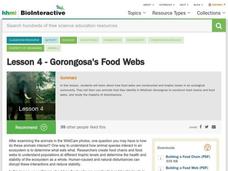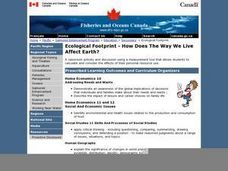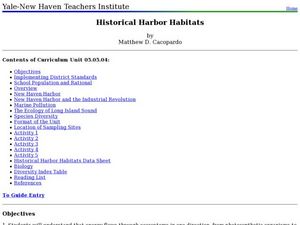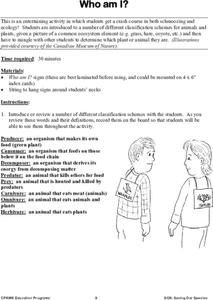Howard Hughes Medical Institute
Lesson 4: Gorongosa's Food Webs
Who eats who in the savannas of Africa? Explore trophic levels with part four of an eight-part series of lessons focused around Gorongosa National Park. After young explorers identify animals using trailcam images, they construct a food...
Channel Islands Film
Human Impact on the Food Web of Santa Cruz Island
What happens when a non-native species is introduced onto an island? Santa Cruz Island, part of the Channel Island chain located off the coast of southern California, provides the perfect laboratory for young environmental scientists to...
Teach Engineering
Food Chains and Food Webs - Balance within Natural Systems
Feast on an informative resource. Scholars learn about food chains and food webs and how these interactions give information about the natural community. A PowerPoint presentation provides information about this concept.
Serendip
Food Webs, Energy Flow, Carbon Cycle, and Trophic Pyramids
The reintroduction of a species to an area doesn't always go as expected. Scholars learn about the reintroduction of wolves into Yellowstone National Park with a video, reading, and discussion questions. They complete a hands-on activity...
Curated OER
Pond Water Web
Students identify the different organisms in the food web. In this biology lesson, students create food chains using the information on cards. They explain what happens if an organism is removed or added in the web.
Curated OER
Food Web Mobile
Students explain the main concepts of food webs and food chains. They
describe the role of animals, plants, and other organisms in cycling energy and matter through a food web by creating mobiles. Lesson contains adaptations for all levels.
Consortium for Ocean Science Exploration and Engagement (COSEE)
Arctic Smorgasbord
Though the walrus spends roughly one third of its time on land, it eats organisms that live on the bottom of the ocean. The first in a series of five, the lesson uses a variety of plant and animal cards to have scholars build an arctic...
Curated OER
Regents High School Examination: Living Environment 2005
The 2005 version of the Regents High School Examination in the area of ecology is as comprehensive as previous years' exams. It consists of 40 multiple choice questions on everything from the structure of DNA to the interactions within...
Serendip
The Ecology of Lyme Disease
Areas that previously included no risk of Lyme disease now have cases every year. Scholars learn about the spread of Lyme disease and the relationship with ecological succession. Then, they discuss possible solutions using the known food...
Curated OER
Ecological Footprint--How Does The Way We Live Affect Earth?
Young scholars demonstrate an awareness of the global implications of decisions that individuals and families make about their needs and wants. They identify environmental and health issues related to the production and consumption of...
Curated OER
Texas Ecoregions Summary Sheet
In this ecoregions of Texas worksheet, young scholars complete a summary of a particular ecoregion in Texas. They find the producers and consumers of the region, they draw a food chain, the draw a food web, and they complete an energy...
Chicago Botanic Garden
Leaf Litter Ecology Lab
Some organisms spend their entire lives in leaf litter. The third in a series of six is a great lesson exploring the community of leaf litter. Groups gather and then spread leaf litter over white paper and remove leaves/twigs while...
Beyond Benign
Ecological Footprint
How does your lifestyle measure up in terms of your ecological footprint? Young ecologists examine their impact on the planet using an insightful online calculator. A short quiz asks users to rank the size of their homes, their energy...
Curated OER
Historical Harbor Habitats
Tenth graders create food web displays in the classroom. For this ecology lesson, 10th graders identify the different pollutants in the environment and their effect on organisms. They collect samples of sediments from the harbor and...
Curated OER
Who Am I?
Young scholars classify organisms into one of five categories: producer, consumer, decomposer, predator, or prey. Students play a "Who Am I" game. Signs are hung on the backs of fellow young scholars They must ask questions to determine...
Curated OER
Species Diversity in Ecosystems with Different Techniques of Land Management
Learners visit numerous places to help in their understanding of Ecology. In this biology lesson plan, students will learn about characteristics and how to identify numerous plants and animals. This lesson allows for many field trip...
Curated OER
Where's Dinner?
Upcoming marine biologists consider a list of organisms residing near the Lost City hydrothermal vents and construct a food web. They compare the food web to that of a cold seep community, of which they should have previous knowledge....
Curated OER
Wilderness Survival: A Field Practicum
Students use hands-on field-testing of authentic application from principles pertaining to: Psychology- A. Develop a positive, can-do attitude with a high degree of self-reliance that is transferable to human interactions outside of the...
Curated OER
Something Fishy - Bioaccumulation of Mercury
Students explore the dangers of eating high levels of mercury and how small amounts of mercury in water accumulate in greater quantities in organisms higher in the food chain. They list the health of effects of high levels of mercury on...
Curated OER
Nitrogen Cycle
Students identify the main concepts and ideas of the nitrogen cycle.
They review key concepts covered up to this point in ecology including food chains, food webs, energy pyramids, and bio-geochemical cycles.
Curated OER
Ecosystem Interdependence
Students outline a scenario demonstrating ecosystem interdependence. They explain the effects of this change according to the food web. They give a positive example such as increased rain and have the students call out answers to your...
Curated OER
Wilderness Survival: A Field Practicum
Students are provided with hands-on-field testing of authentic applications from principles pertaining to: Psychology A. Develop a positive, can-do attitude with a high degree of self-reliance that is transferable to human interactions...
Polar Trec
Calorimetry Lab
Young people between the ages of 11–13 need on average about 2,000 calories per day. Within the lab, groups learn about calorimetry and respiration. They explore how it pertains to humans and animals living the Arctic where cold...
Teach Engineering
Biomimicry and Sustainable Design - Nature is an Engineering Marvel
Discover how copying nature can be beneficial to humans. Scholars read articles about examples of biomimicry and its potential applications. Along the way, they learn about Nature's Nine Laws and how they relate to biomimicry. This is...
Other popular searches
- Ecology Food Webs Chains
- Ecology Food Webs Reading
- Marine Ecology Food Webs
- Ecology Food Webs Exercise
- Ecology Food Webs Ocean
- Ecology Food Webs Exrcise

























